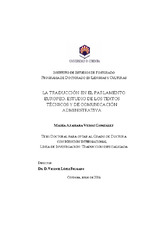Mostrar el registro sencillo del ítem
La traducción en el Parlamento Europeo. Estudio de los textos técnicos y de comunicación administrativa
| dc.contributor.advisor | López Folgado, Vicente | |
| dc.contributor.author | Veroz González, María Azahara | |
| dc.date.accessioned | 2014-07-16T09:40:47Z | |
| dc.date.available | 2014-07-16T09:40:47Z | |
| dc.date.issued | 2014 | |
| dc.identifier.uri | http://hdl.handle.net/10396/12220 | |
| dc.description.abstract | The research Doctoral Thesis presented here is entitled Translation in the European Parliament: a study of technical and administrative communication texts. Among the different research areas in institutional translation, the present research work attempts to study and discuss UE texts concerned with political, legal, economic and technical and scientific areas, and its main goals are: 1. To identify the linguistic features characteristic of technical and administrative communication texts produced by the European Parliament: Description of discursive aspects. Description of the linguistic aspect. Description and interpretation of rhetorical aspects: nature of the chosen texts and their pragmatic purpose. 2. To determine the most appropriate translation methods to be applied in this case. The main hypothesis of this research is the following: Have technical and administrative communication texts common linguistic features in their English, French and Spanish versions? And if they do have them, will these features be useful for institutional translators? In EU texts translation we theoretically rely on the notion of equivalence to the original; this notion of equivalence to the original has been a debated issue for ages in translation studies and it has been approached by several authors (W. Wilss, 1982; K. Reiss and H. J. Vermeer, 1991; Ch. Nord 1991; 1997; G. Toury 1997). Another problem raised by translation scholars has been how to get the original text and its translation to be «the same text» when all the factors involved in the process are by definition different (J. R. Catford, 1965; B. Hatim and I. Mason 1990; 1998); A. Neubert & G. Shreve, 1992). In addition, EU texts translation posed another problem in addition to the language problem of equivalence, namely, that the equivalence must also be "legal" in principle. Therefore, the translation of EU texts requires identical formulation in each of the official languages (Jover González-Gómez, 2002). Thus, we argue that the legal equivalence is what differentiates the EU texts from other international organizations texts, as theoretically in the former there is neither source text nor target text, the translator having to produce another source text with equal legal validity. (A. Pym 1999). In sum, the translator must reconcile unity and diversity in performing their task, while... | es_ES |
| dc.format.mimetype | application/pdf | es_ES |
| dc.language.iso | spa | es_ES |
| dc.publisher | Universidad de Córdoba, Servicio de Publicaciones | es_ES |
| dc.rights | https://creativecommons.org/licenses/by-nc-nd/4.0/ | es_ES |
| dc.subject | Traducción especializada | es_ES |
| dc.subject | Parlamento Europeo | es_ES |
| dc.subject | Unión Europea | es_ES |
| dc.subject | Traducción inglés-español-francés | es_ES |
| dc.subject | Traducción técnica | es_ES |
| dc.subject | Textos técnicos | es_ES |
| dc.subject | Textos de comunicación administrativa | es_ES |
| dc.subject | Traducción institucional | es_ES |
| dc.subject | Aspecto discursivo | es_ES |
| dc.subject | Aspecto lingüístico | es_ES |
| dc.title | La traducción en el Parlamento Europeo. Estudio de los textos técnicos y de comunicación administrativa | es_ES |
| dc.type | info:eu-repo/semantics/doctoralThesis | es_ES |
| dc.rights.accessRights | info:eu-repo/semantics/openAccess | es_ES |

